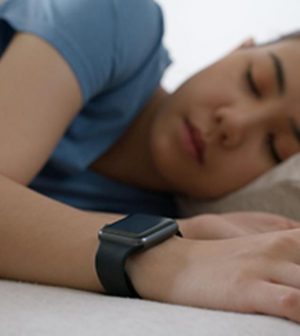- Could Your Grocery Store Meat Be Causing Recurring UTIs?
- Are You Making This Expensive Thermostat Error This Winter?
- Recognizing the Signs of Hypothyroidism
- 10 Strategies to Overcome Insomnia
- Could Artificial Sweeteners Be Aging the Brain Faster?
- Techniques for Soothing Your Nervous System
- Does the Water in Your House Smell Funny? Here’s Why
- Can a Daily Dose of Apple Cider Vinegar Actually Aid Weight Loss?
- 6 Health Beverages That Can Actually Spike Your Blood Sugar
- Treatment Options for Social Anxiety Disorder
For Athletes, Diet Might Influence Sleep Patterns

Need to get your shut-eye on time? What you eat could make a difference, according to a new study.
Researchers found that college athletes who ate more carbohydrates and vitamins B12 and C tended to go to sleep and wake up earlier.
It’s possible that these nutrients might increase synthesis of vital hormones that regulate sleep, including serotonin and melatonin, the authors said.
“For athletes, success is measured not only by readiness to perform but also resiliency on and off the field,” said first author Lauren Rentz, a doctoral student at West Virginia University.
“We know that sleep helps the body heal from daily physical and mental stress and influences future physical and mental performance,” she said. “The relationship between sleep and nutrient intake hasn’t been researched as thoroughly in high-performing athletes, who consistently experience large amounts of stress.”
For the study, researchers evaluated sleep and nutritional patterns of 23 women who play college soccer. Each of the athletes wore a smart ring that tracked their sleep for 31 straight nights during the season. They also recorded their food intake during the final three days.
The study found links between nutrient consumption and sleep timing but not duration.
Most of the athletes averaged seven to eight hours of sleep a night. They also met recommended intake for many vitamins, but not for all their nutritional needs.
About half were deficient in vitamins A and K as well as protein. Nearly all failed to consume recommended amounts of vitamin D and carbohydrates.
The findings were presented Friday at a meeting of the American Physiological Society, in Long Beach, Calif.
“The use of wearable technology has become very popular among athletes, and our study shows how wearable data can be used by practitioners or athletes themselves to become more in tune with their health,” Rentz said in a meeting news release. “Wearables are great for capturing the body’s response to physiological stressors without adding more stress.”
The authors said their results shouldn’t be interpreted as proof of cause and effect. The results show how various aspects of health can contribute to performance and recovery potential, they said.
The next step is to evaluate similar health patterns in a larger group of people. The authors plan to examine how these patterns may influence athletes’ success.
Research presented at medical meetings should be considered preliminary until published in a peer-reviewed journal.
More information
Children’s Hospital Colorado has more on student athletes and sleep.
SOURCE: American Physiological Society, news release, April 21, 2023
Source: HealthDay
Copyright © 2026 HealthDay. All rights reserved.










